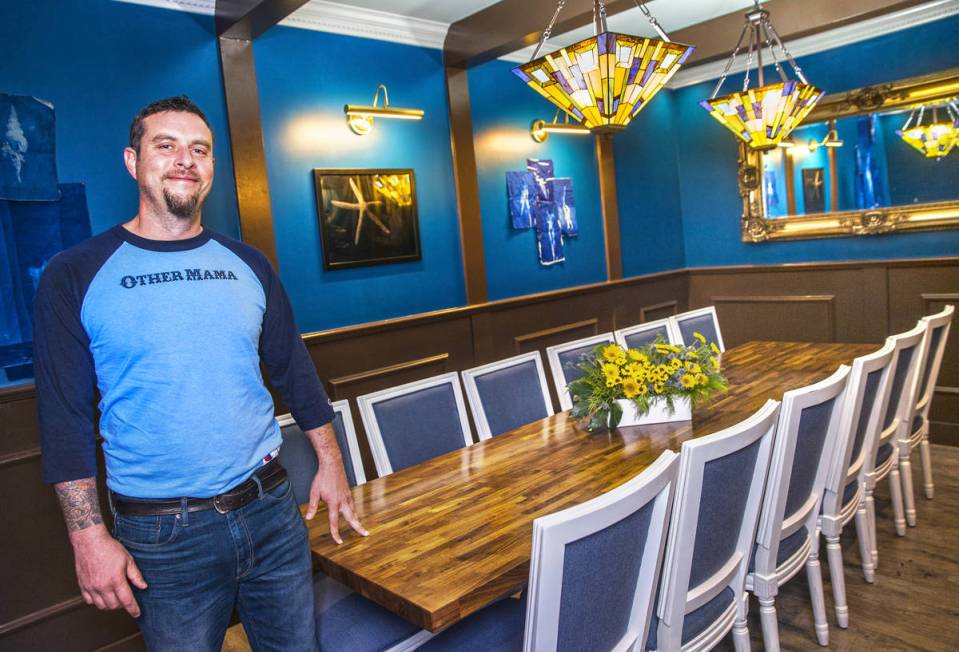Dan Krohmer returning to Other Mama, cutting employees in on profits

Other Mama’s Dan Krohmer, who was on the verge of selling the award-winning restaurant to Zappos founder Tony Hsieh at the time of Hsieh’s death in November, is headed back to Las Vegas to retake the reins.
“I’m jumping back in,” Krohmer told the Review-Journal over the weekend, while snowed-in in Oklahoma City. “I’m going to be the chef running stuff. I’m going to be working on new menu (items). I feel very excited to be hungry again.”
It will not, however, be business as usual as Other Mama moves forward
“I’m going to be giving my whole staff 50 percent of the net profit from the restaurant,” the chef explained.
Krohmer’s original deal to sell all of his local restaurants and his Pahrump farm to Hsieh had reserved a 25 percent interest in Other Mama for the restaurant’s general manager, Alan Holmes. Krohmer says his new policy is simply an expansion on that idea.
“Employees make the restaurant,” says Krohmer. “It can’t be about me. I’ve found the more I make it about me, the worse I feel. The more (money) I make, the less I know what to do with it.”
Krohmer also explained that while the sale of Other Mama and his farm to Hsieh was never finalized, a related deal buying out of his contract to operate the Japanese restaurant Hatsumi and the Mexican spot in Fergusons Downtown was.
“I’m completely done with Fergusons, I have no connection with them,” he said of the East Fremont Street project where he had operated those two eateries before COVID-19.
All of this comes about a year into the pandemic, which has had immeasurable effects on the restaurant industry. That time has been even more tumultuous for Krohmer, who once viewed the sale of his local interests so he could work with Hsieh in Park City as a way to start over.
While the chef is “not ready” to talk about his time in Utah with Hsieh, he says that he’s “been spending a lot of time reconnecting with my physical health, my mental health” in the months since.
“I was not in a very good place after Park City,” he admits.
In reality, Krohmer wasn’t in a very good place before Park City either. He was quarantining on his farm over the summer, contemplating the future of his businesses, when he received an invitation to get out of town.
“I got this random invitation to go up to Park City, that was on some random group text. I was super-depressed. I was super-miserable. And I was sitting around drinking by myself. So getting up there, when Tony brought up (the idea of) me staying there, my first thought was just about being bought of my contract for Fergusons. And then he brought up the thing about Other Mama.”
The plan had been for Hsieh to acquire Krohmer’s Las Vegas interests, freeing him up to work directly with the entrepreneur on new ideas. The purchases were eventually separated into two deals, only one of which was finalized before tragedy struck and Hsieh died.
As he prepares to return to Other Mama, the chef is keenly aware of what his team has been doing without him.
“These guys have been crushing it,” he says of the restaurant’s staff. “I’ve been an absentee owner for a bit, and for the past six or seven months these guys didn’t even know who was owning this restaurant. But they’re crushing it.”
That realization reinforced his belief that the traditional business model for restaurants doesn’t accurately reflect what it takes to make a business successful. So he’s changing the way profits are distributed.
“As an employee, each job is going to have a rate — almost like a stock option. So Alan’s will be 25 percent. Other employees, from dishwashers, from the bottom (up), are going to have participation in a net profit dividend each quarter.”
Those distributions will be made as a quarterly bonus, in addition to salaries and tips. Krohmer is hoping that by having “skin in the game,” employees will be more aware of the costs associated with everything from a broken wine glass to paying for social media promotion. With that in mind, he thinks they’ll be able to make business decisions together.
“At the end of the day, (restaurant expenses) will come out of what they’re making — not that we deduct it from their salary, but it’s part of their bonus. And then as a group we’ll come together quarterly and say ‘With this extra money, do we want to share in health insurance? Do we want to do this?’ And we can actually make decisions as a group.”
So what inspired this new approach to running his business? Was it COVID, his time in Park City, the soul-searching he’s been through since Hsieh’s death? Or is it just the natural evolution of his career?
The chef says he’s been asking himself the same question. He takes his time before answering, and chooses his words carefully.
“The honest, real answer is that I’ve seen that money cannot buy happiness,” he says solemnly.
After reflecting on it a bit longer, he says, “I’ve spent a lot of time reevaluating what success means to me over the past couple of years, and it’s time to take a new direction for myself and my staff.”
Contact Al Mancini at amancini@reviewjournal.com. Follow @AlManciniVegas on Twitter.